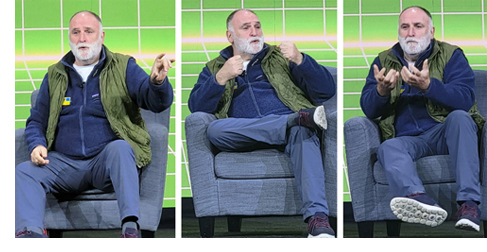Keynote José Andrés is Providing Meals—and Hope—in Times of Crisis
Print this Article | Send to Colleague

“We show up at our best, giving people the best we can, because that sends a message.” This statement from José Andrés resonated with the 1,000+ attendees at Tuesday morning's keynote. This world-famous chef is known for more than just his food—he runs the World Central Kitchen (WCK), a nonprofit organization that provides hot meals to people affected by natural disasters and other crises around the world. Hot meals provide more sustenance and support than just donating food, according to Andrés.
Born in Spain, Andrés became a household name in the culinary world. He opened a number of successful restaurants, wrote cookbooks and appeared on TV shows. But it wasn't until 2010 that he truly became a global figure with the founding of the WCK. The organization has responded to dozens of disasters and emergencies around the world. In the aftermath of the 2010 earthquake in Haiti, for example, WCK set up a network of food trucks that served hot meals to thousands of people each day. In Puerto Rico, following Hurricane Maria in 2017, they provided more than 3 million meals—and in each location, they tailor what they cook to the regional cuisine for added comfort.
Providing food during these emergencies is a massive logistical undertaking—getting food brought in, cooked and distributed in a landscape that’s already a disaster zone has proven to be very challenging. The speed in which he mobilizes is incredible. Andrés said, to make this work, they don't wait for everything to run perfectly. He said they "embrace the complexity of the moment." Rather than planning for every possibility, they start helping and adapt as they go. Andrés said that being pragmatic about what you need to get started allows you to start sooner and adapt and grow along the way.
According to Andrés, "The mission has to be clear, and the mission has to be shared by all." The WCK mission is very simple: Provide food and water to people in need. For companies, it’s important for employees to have a common goal and work towards that goal across departments. Fulfilling that mission or goal requires working at two speeds—long-term (e.g., filling the warehouse so many people can be fed) and immediate (feeding some people now). So, a takeaway for ProMat attendees can be: The job is not to fill the warehouse; the job is to serve the customer.
Andrés said his organization requires immediacy, and sometimes moving forward is the best thing you can do. He said, "The worst decision we can make is not a bad decision. The worst decision we can make is no decision." If you don’t make a decision, nothing will happen.
In his organization, the logistics of providing meals is challenging. Andrés said the supply chain industry is also facing challenges, given recent delays and growing scrutiny on the industry. He said there’s a need to take a 360-degree look at logistics and ensure all components (and people) are working together. And, good logistics will be essential to solving issues of hunger and other emergency needs.
To Andrés, food is more than just sustenance—it is a symbol of hope, community and resilience. He has shown time and again that, even in the face of seemingly insurmountable challenges, food can be a powerful tool for healing and rebuilding.

